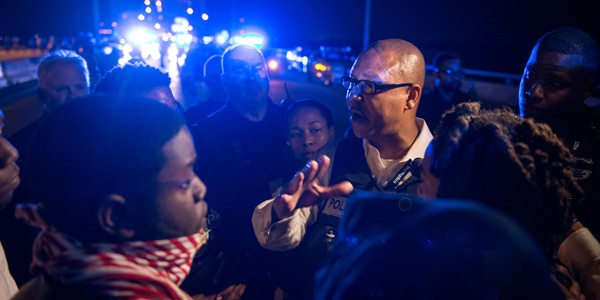 Brandon Dill
Brandon Dill
Michael Rallings with crowd during protest
Legal director for the American Civil Liberties Union (ACLU) of Tennessee said Friday’s ruling that the Memphis Police Department (MPD) violated a 1978 consent decree barring political surveillance of citizens is a win for free speech nationwide.
Thomas H. Castelli, ACLU-TN legal director, said that the Blanchard v. City of Memphis ruling could make Memphis a “standard-bearer” as other cities learn to balance free speech and advancing technology.
[pullquote-2]
“This ruling is a tremendous victory for free speech in Memphis and nationwide,” Castelli said. “The court not only recognized that under the consent decree Memphis residents enjoy even stronger free speech protections than those afforded by the First Amendment, but that this uniquely positions Memphis to be a standard-bearer for cities across the country as they wrestle with how to protect individuals’ privacy and free speech in the face of ever-growing surveillance technologies.”
U.S. District Judge Jon McCalla ruled that the city failed to train its officers on political intelligence as defined by the 1978 consent decree. This failure led to a “shared misunderstanding of the decree’s requirements and a significant number of violations.”
“Every community must decide how to ensure an appropriate balance between public safety and protecting personal rights,” the court wrote, “By successful implementation of the consent decree, MPD has the opportunity to become one of the few, if only, metropolitan police departments in the country with a robust policy for the protection of privacy in the digital age. The court recognizes this may be a heavy burden; being a pioneer usually is.”
The court imposed sanctions “designed to ensure future compliance” with the consent decree.
They include:
•
Requirements that the Memphis police department revise their policy on political intelligence and train officers accordingly.
•
Establishing a process for approving criminal investigations that may incidentally result in gathering political intelligence. Establish written guidelines for the use of social media searches.
•
Maintaining a list of all search terms used in social media collators and submit the list to the court quarterly.
•
Court-appointed independent monitor to supervise the implementation of these sanctions.
[pullquote-1]
MPD Director Michael Rallings responded to the ruling Saturday, saying that the department has made an efforts in the past to not violate the decree: “The Memphis Police Department has been proactive in our approach by putting methods in place, prior to the ruling, to ensure that we stay within the limits of the decree.
“We look forward to working with the court to ensure compliance.”
Hedy Weinberg, executive director of ACLU-TN, called Friday’s ruling an important decision, as free speech is “crucial” and engaging in dialogues about injustices are “vital” to democracy.
“This important decision ensures that activists in Memphis can continue to fight the good fight without fear of unwarranted police surveillance,” Weinberg said. “The right to free speech is crucial to our ability to speak out against injustice and to hold the government accountable. Especially in this day and age, being able to truly engage in dialogue about important issues without the threat of intimidation is vital to our democracy.”